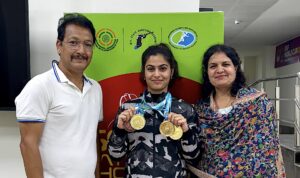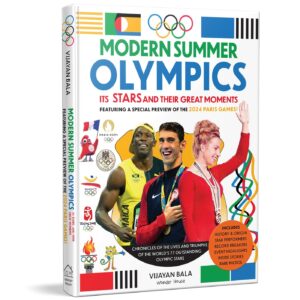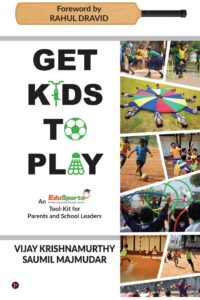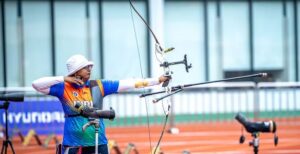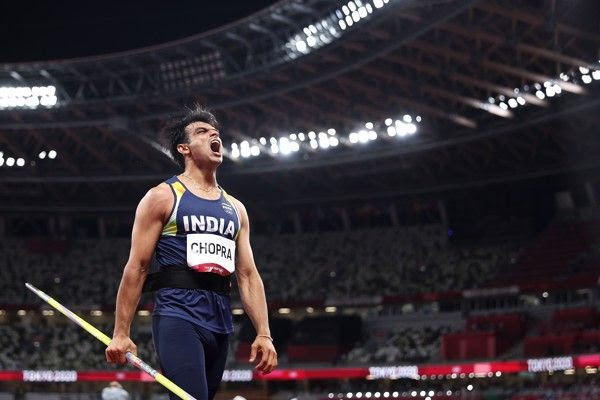
Neeraj Chopra owned the greatest of sporting stages, winning the Javelin Throw gold in the Olympic Games in Tokyo on Saturday and pinning myriad freeze frames in our minds. Forever. And, quite instinctively, every Indian would have seen a bit of oneself in the down-to-earth and humble champion.
Neeraj Chopra, him of the big-event temperament, dominated the field which included six throwers ranked higher than him on the World Athletics Javelin Throw chart. Never has an Indian athlete, across several sport, bossed his or her event in the Olympic Games like he did on Saturday night.
He scattered the opposition with his first throw of 87.03m and followed it up with a bigger 87.58m on his second attempt. He was business-like, professional and in a world of his own, but he filled the hearts with joy and pride. It was the result of his skill, focusing on finding optimum power at the time of the release to send the spear soaring away into the night sky.
On an assortment of screens, TV sets, laptops, mobile phones, we watched him stay calm and let his throwing be the best form of expression. Of course, we also watched him applaud Johannes Vetter, who has thrown the greatest distance among the contemporary competitors. And we saw him merely spread his arms when he had confirmation that the gold was his.
Besides the obvious manner in which he made the others realise that they were fighting for the minor medals, Neeraj Chopra’s greatest conquest on Saturday night was with his own mind. In keeping it free of clutter – he calls it “idhar-udhar ki baatein” – he ensured that he could deliver his best show.
Of course, he is acutely aware of the succession of misses of Indian athletes with great legacy. For, he openly acknowledges their contribution to keep track and field sport going in the country at a time when many other disciplines have flourished and caught the imagination of the young population.
India has had athletes who raised hopes. From the fourth-place finishes by Milkha Singh (1960) and PT Usha (1984) to Gurbachan Singh Randhawa’s fifth in 1964 and Anju Bobby George’s fifth place in 2004, from Sriram Singh’s seventh in 1976 to Krishna Poonia’s sixth and Vikas Gowda’s eighth in 2012 as well as Lalita Babar’s 10th, Indians have fought to make an impact.
Besides, the contingent, largest sent by India to any Olympic Games, had drawn a blank as far as gold medals in Tokyo2020 were concerned. Many a favourite had bitten the dust, some sinking without even being the medal race. And, as the last Indian competitor in the Games, he would have felt the burden of pressure no end.
Yet, he did not let any of this impact him once he reported to the call room in the Olympic Stadium. Come to think of it, his ability to keep the mind in the present did not allow him to think of the gold medals he won in the 2016 World Junior Athletics Championships and the 2018 Commonwealth Games and the 2018 Asian Games.
His victory has also been the pinnacle of the public-private support system around him. After he faced an elbow injury in 2018, the Athletics Federation of India enabled his rehabilitation under Dr. Pardiwala’s care in Mumbai. It then found him a biomechanicst-coach in Dr. Klaus Bartonietz, convincing the Sports Authority of India to pay him his annual salary.
Basing him in Potchefstroom in South Africa for several months and then keeping him in the National Camp in the Netaji Subhas National Institute of Sports in Patiala during the pandemic – moving briefly to the Kalinga Stadium in Bhubaneswar during peak winter – the ecosystem around him kept him in good shape and eager for competition.
In typical earthy fashion, he asked for competitive exposure during the second wave of the pandemic. It was not the easiest of things to travel to European nations at a time when many countries had closed their airports to Indians. But when the might of the powers-that-be lends its shoulder, wheels do move. And he has been in Europe since early June.
That, by his own admission, allowed him to regain familiarity with his opposition and not feel any pressure when he saw them on the big stage. For all you know, he was taking part in some competition in the neighbourhood. With a greatly positive attitude and immense belief that he had done the best preparation, it was only a question of producing some great throws.
The Morning After. It is usually a good time to revisit the emotions and see if they are in keeping with the stature of the achievement. But this time it has been different. Many an Indian would have been unable to sleep, celebrating the rarest of Indian victories on the greatest of sporting platforms. Truth to tell, evening flowed into night which merged seamlessly into day.
Yes, many hours later, it has not yet sunk in. Never even in my wildest dreams would I have imagined that I would live to see the Indian men’s hockey team climb the podium at an Olympic Games and a few days later an Indian would cause the National Anthem to be played in the Olympic Stadium by winning an athletics gold medal.
The 23-year-old’s feat made Indians around the country react in their own distinctive manner, with the legendary Sunil Gavaskar breaking into song. It made grown up folk cry unabashedly that India had ended the gold medal drought since Abhinav Bindra’s crown in 2008. His gold medal will have immediately revived flagging self-belief among Indian athletes.
Yet, the import of his achievement – an athletics gold medal in the Olympic Games, no less – will be known in the spurt in sporting activity around the country. The challenge for sports administrators will be to make the most of the momentum gained by the performance of the Indian athletes in what was the most successful Olympic campaign in Indian history.
This piece was first published in News18.com
